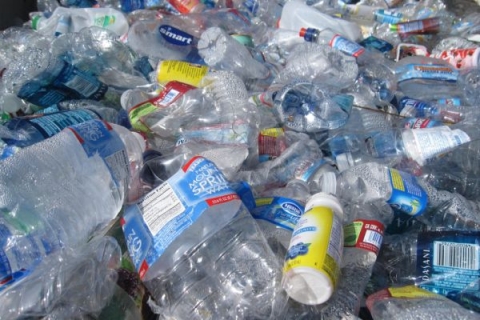

One of the country’s leading experts in plastic waste and pollution urged MPs to adopt a joined up approach to the plastic waste problem
20 January 2022
5 min read
One of the country’s leading experts in plastic waste and pollution urged MPs to adopt a joined up approach to the plastic waste problem at a formal meeting of the UK Parliament’s Environment, Food and Rural Affairs Committee (EFRA).
Professor Steve Fletcher, Director of the Revolution Plastics initiative at the University of Portsmouth, gave evidence as part of the Plastic Waste inquiry this week.
When asked what is required to get the most out of the current plastic recycling system, Professor Fletcher explained that any changes would only work if the entire system of production, consumption and waste management was looked at as a whole. He said: “Isolated intervention doesn’t really work unless the rest of the system is adapted to that intervention or configured to allow that intervention to work. I would caution against trying to solve individualised parts of the problem in isolation, without thinking about the entire system. We ought to be aiming for a systemic shift, rather than trying to solve small problems throughout the system.”
Professor Fletcher also challenged MPs to think of the plastic crisis on a global scale, and not just a national one. He asked: “What is the UK vision for plastic recycling in the context of the global plastics crisis? The other factor to consider is the likely start of negotiations later this year towards a global legally-binding agreement on tackling plastic pollution arising the next UN Environment Assembly. Whatever we choose to do at the UK scale, will also have to consider any global agreement that is down the track as well.”

Land restoration is a key factor in reducing pressures on ocean ecosystems and allowing them to continue providing economic, social and hazard mitigation benefits to coastal communities.
Professor Steve Fletcher, Director of Sustainability and Environment
He is advising policy makers to focus on reducing the complexity of the plastic market. The huge range of plastics makes it almost impossible to label plastic consistently and have recycling facilities in place to deal with such diversity. Professor Fletcher urged MPs to think about how best to sort plastics. Should the responsibility be placed on the user (business or domestic) to correctly dispose of the plastic? Or should the responsibility lie with the producer? Citing recent research carried out by the University of Portsmouth, which found that around 50 per cent of people don’t really understand the recycling system, Professor Fletcher recommended that MPs should focus on “having a system that takes responsibility away from individuals and households.”
Professor Fletcher also asked the meeting to consider biological chemical recycling using enzymes, as well as more traditional mechanical and chemical recycling systems. Since researchers at the University of Portsmouth discovered an enzyme that can break down PET plastic (the type commonly used to make single use drinks bottles) in 2018, the University has been at the forefront of the development of this type of recycling.
Professor Fletcher told the panel, “we have found that if we take a PET bottle, and put it through an enzyme digestion process that breaks the bottle down to it’s component chemical parts, it allows a new PET bottle to be made, with virgin (plastic) like qualities. It can be recycled infinitely through this type of technology, as well as reducing by 80 per cent the energy required to produce that recycled bottle compared to using virgin plastic and it reduces greenhouse emissions by 40 per cent.”
Professor Fletcher was joined by Professor Michael Shaver, Director, Sustainable Materials Innovation Hub and Professor of Polymer Science at University of Manchester, Jenny Grant, Head of Organics and Natural Capital at The Association for Renewable Energy and Clean Technology (REA) and Richard Daley, Managing Director and CTO of chemical recycling company at ReNew ELP.
Land restoration is a key factor in reducing pressures on ocean ecosystems and allowing them to continue providing economic, social and hazard mitigation benefits to coastal communities.
Professor Steve Fletcher, Director of Sustainability and Environment
Professor Fletcher is Professor of Ocean Policy and Economy and Director of Revolution Plastics at University of Portsmouth. He is one of the top 10 most-cited scientists in the field of Marine Policy (Google Scholar), with more than 100 peer-reviewed publications and research reports. He is Ocean Lead of the International Resource Panel by UN Environment, and former Chief Strategy Officer for the UN Environment World Conservation Monitoring Centre.
Professor Fletcher attended COP26 where he announced the launch of the University’s Global Plastics Policy Centre. The Centre is the first of its kind and will help find sustainable policy solutions to tackle plastic pollution around the world. It is designed to give governments and industry groups the evidence needed to make better decisions around plastic policies and ultimately help reduce the negative impacts of plastics.
Professor Fletcher says: “I am delighted the Select Committee is taking the issue of plastic waste seriously. We know that plastic pollution is exacerbating climate change and that every stage of the plastics life cycle directly contributes to greenhouse gas emissions. It is vital that a systemic approach is taken to combat the problem of plastic waste. At the University of Portsmouth, we are addressing many of these issues through our Revolution Plastics initiative.”
